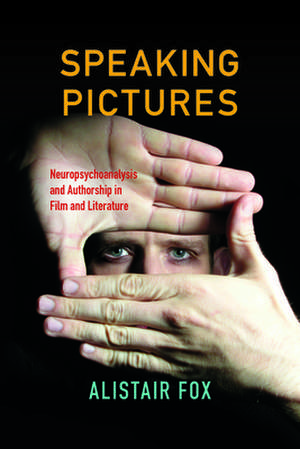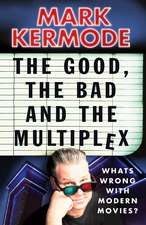Speaking Pictures – Neuropsychoanalysis and Authorship in Film and Literature
Autor Alistair Foxen Limba Engleză Paperback – 20 mar 2016
| Toate formatele și edițiile | Preț | Express |
|---|---|---|
| Paperback (1) | 208.33 lei 6-8 săpt. | |
| Wiley – 20 mar 2016 | 208.33 lei 6-8 săpt. | |
| Hardback (1) | 479.04 lei 6-8 săpt. | |
| MH – Indiana University Press – 20 mar 2016 | 479.04 lei 6-8 săpt. |
Preț: 208.33 lei
Nou
Puncte Express: 312
Preț estimativ în valută:
39.87€ • 43.29$ • 33.49£
39.87€ • 43.29$ • 33.49£
Carte tipărită la comandă
Livrare economică 22 aprilie-06 mai
Preluare comenzi: 021 569.72.76
Specificații
ISBN-13: 9780253020918
ISBN-10: 0253020913
Pagini: 310
Dimensiuni: 152 x 227 x 24 mm
Greutate: 0.46 kg
Editura: Wiley
ISBN-10: 0253020913
Pagini: 310
Dimensiuni: 152 x 227 x 24 mm
Greutate: 0.46 kg
Editura: Wiley
Notă biografică
Cuprins
Acknowledgments
Introduction
1. Changing Configurations in Theories of Fictive Representation
2. Why Does Fictive Representation Exist?
3. The Wellsprings of Fictive Creativity
4. The Materials of Fictive Invention
5. The Informing Role of Fantasy
6. The Shaping of Fictive Scenarios by the Author: Motivations, Strategies, and Outcomes
7. The Exploitation of Generic Templates and Intertexts as Vehicles for Affect-Regulation
8. Theories of Reception in the Twentieth and Twenty-First Centuries
9. A Neuropsychoanalytic Theory of Reception
10. Intersubjective Attunement, Filiation and the Re-creative Process: Jules and Jim-from Henri-Pierre Roché to Francois Truffaut
11. The Conversion of Autobiographical Emotion into Symbolic Figuration: William Shakespeare's Hamlet
12. Tracking a Personal Myth through an Oeuvre: the Films of François Ozon
Conclusion
Filmography
Select Bibliography
Index
Introduction
1. Changing Configurations in Theories of Fictive Representation
2. Why Does Fictive Representation Exist?
3. The Wellsprings of Fictive Creativity
4. The Materials of Fictive Invention
5. The Informing Role of Fantasy
6. The Shaping of Fictive Scenarios by the Author: Motivations, Strategies, and Outcomes
7. The Exploitation of Generic Templates and Intertexts as Vehicles for Affect-Regulation
8. Theories of Reception in the Twentieth and Twenty-First Centuries
9. A Neuropsychoanalytic Theory of Reception
10. Intersubjective Attunement, Filiation and the Re-creative Process: Jules and Jim-from Henri-Pierre Roché to Francois Truffaut
11. The Conversion of Autobiographical Emotion into Symbolic Figuration: William Shakespeare's Hamlet
12. Tracking a Personal Myth through an Oeuvre: the Films of François Ozon
Conclusion
Filmography
Select Bibliography
Index











